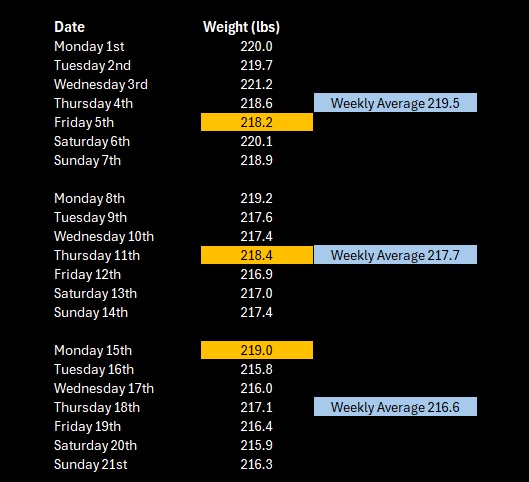Do you ever wonder why your weight fluctuates on a daily basis both up and down? Have you ever wondered why your weight has gone up one day unexpectedly? Their are many reasons why your weight will fluctuate on a daily basis, the below blog explains why some of these may be and reason to keep going when it does.
You should remember that your weight is a combination of various things in the body like Water, Body Fat, Muscle Mass, Bones, Tissues and Organs.
Also bare in mind to put on 1lb of fat you need to consume 3500 additional calories to what your body burns so it is unlikely that if your are following a healthy approach that if your weight goes up on one day it is because of eating too many calories, it is most likely due to one/several of the below factors.
Reasons for Weight Fluctuations:
Water Retention: Water retention can cause temporary weight gain, especially when eating high-sodium or high-carbohydrate foods. Exercise can also lead to temporary water loss.
Food and Drink Intake: The weight of food and drink you consume throughout the day will add to your overall weight. If you have consumed a lot of water the previous day this can result in your weight being higher on the scale,
Bowel Movements: The elimination of waste products through bowel movements can cause a decrease in weight.
Exercise: Exercise can lead to temporary water and weight loss.
Hormonal Changes: Hormonal fluctuations, particularly during menstruation, can affect water retention and weight.
Stress and Sleep: Stress and lack of sleep can also contribute to weight fluctuations. Having a bad nights sleep can cause cortisol levels to increase in the body, when your body has higher cortisol it can result in the body storing more water which can increase the weight on the scale.
Medications: Certain medications can cause water retention or other changes in body weight.
Alcohol: Alcohol can cause weight fluctuations in several ways. Alcohol is a carbohydrate so consuming alcohol can result in water being retained, additionally to that drinking alcohol can can disturbed sleep which will cause cortisol levels to rise which can also cause further water retention. Additionally to that consuming alcohol can cause dehydration which can also affect weight. Not to mention what other food you might consume when drunk or hungover.
Due to the above factors, the best way to monitor and track your weight is to weigh yourself daily and then take the average weight for the week as a whole, by doing this you can compare the movement in the average weight for each week over time and check that this is moving in the right direction. This approach also reduces the effect of daily weight fluctuations.
Their are also key things that you can do to help with daily weight fluctuations:
Keep Hydrated – Keeping well hydrated allows your body to ensure it has enough water to prevent the body from holding on to water which it will do when dehydrated.
Limit Salt – Sodium in the diet causes the body to retain more water naturally so limiting Sodium in the diet will prevent this.
Get enough rest and sleep – This will help to maintain your bodys cortisol levels which can help prevent water retention.
The below example shows why weighing yourself daily is the best approach due to daily weight fluctuations. From the example below if you weighed yourself once a week, depending on what day you weighed yourself in that week it could show that you have put on weight. However, if you weighed yourself daily and used the weekly average weight it would accurately show that you have been losing weight.
As their is so many reasons that your weight can fluctuate daily, this is why weighing daily is more accurate using a weekly average.
From the below example, if you only weighed yourself once a week at happened to weigh yourself on the 5th, 11th and 15th then it would show that you have put on weight when in fact using the weighing daily method and the weekly average over the 3 weeks you have in fact dropped 2.9 lbs in weight.




